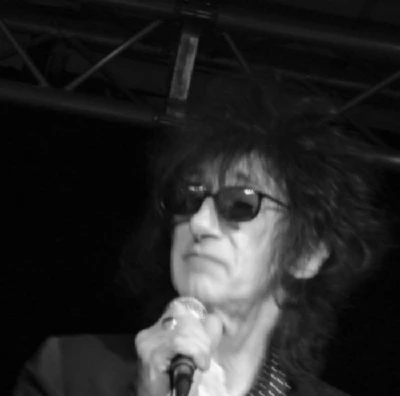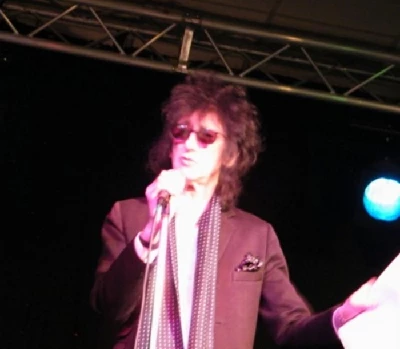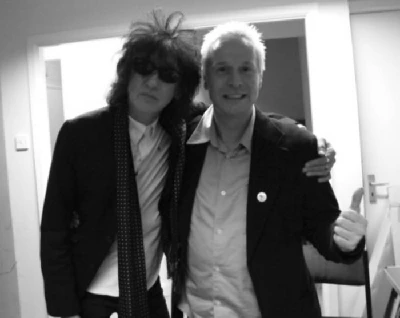published: 1 /
6 /
2010

Spencer Robertshaw speaks to pioneering punk poet John Cooper Clarke at a show in Leeds about his writing and continued enthusiasm for performing poetry
Article
Writing a piece about a writer can be a little bit tricky. Part of you might be thinking, in a vain attempt to show that you as well can write, “Well, I better use ten dollar words and clever witticism." You have to consider your subject and how an article can be approached to make it interesting enough for the reader to give you five minutes of their precious time. I considered all of this when I tried to work out a good line of attack and then gave up, the reason being the subject and the subject matter. There was simply no way I could out word or use witticism which would make me shine.
The reason is the subject, John Cooper Clarke. He is without a doubt the best wordsmith we have and have ever had. I wouldn’t try to be ‘clever’ in his company - he could (but wouldn’t) eat me alive in a nanosecond. His work is in A level syllabuses and political books and on films, radio and TV and it seems to pop up in crucial moments at crucial times touching crucial people – there is Alex Turner from the Arctic Monkeys just for a start and there have been a lot more before him. It shows that John’s output is always appreciated and copied by the talented en masse. Compared to all our great writers as an equal talent perhaps as Ray Davies or David Bowie are to music, John Cooper Clarke is the same to words and the delivery of them.
He has travelled on many forms of transport (mostly hire cars) and most importantly when the wheels fell off them his didn’t. He just dusted himself off and kept going. It has been over 30 years ago now since John, who was born on January 24th 1949, wrote ‘Beasley Street’ about a typical working class street in his native Salford. This Manchester connection made his early work handy for collaborating with Joy Division with whom he played gigs; the vibrant late 70’s and early 80’s Manchester music scene, many of its other musicians who he has worked with and earned him the praise of the late Tony Wilson of Factory Records.
Now the man behind the hairstyle is back with an event filled tour, bigger and better than ever. Perhaps it is his achievements and history which make him the unique hero to many, but whatever it is that he has he has got it is something very special.
Saturday night, it is a typical dirty ,dark ,cold Yorkshire evening. I am waiting to speak to John Cooper Clarke’s manager to arrange the evening’s events which will cumulate with me having a chat with the people’s poet and man who should be Laureate. This will be after watching him perform at Leeds Irish Centre (an under-rated venue which has had some legendary acts through its doors in the 40 years it has been running).
The evening starts off with John’s support act, Frank Sidebottom, who is in himself a well versed and battle hardened comedian, Sidebottom’s act is great. His set tonight is full of jokes about Manchester and its music scene, but also contains other great pieces. Frank talks about the Beatles and is the fifth Beatle in his portrayal and it finishes with him having a good old sing-a-long with the audience.
The act ends and there is a break.
Then it happens... a tall, thin figure struts on to stage with his trademark Edward Scissorhands hairdo, darkened shades, slim fitting trousers, patent Chelsea boots and jacket complete with silk scarf and pocket handkerchief. There's an air of authority that only years and years of experience and hard work can give. John starts with a few quickfire jokes that leads into his first poem, ‘Hire Car’.
“Rent it, dent it, bang it, prang it
Bump it, dump it, scorch it, torch it
Crash and burn it, don't return it
Lost deposit, let 'em earn it
Who cares, it's on the firm
It's a hire car baby.”
This is delivered with precise well-timed ease. Jokes, questions and wordplay are fired into the audience with a timing that most comedians wish and work for all of their career and sadly don’t achieve. John’s classics are delivered including ‘Beasley Street’.
“A lightbulb bursts like a blister
The only form of heat
Here a fellow sells his sister
Down the river on Beasley Street.”
There is also the reworked ‘Beasley Boulevard’.
“Somebody saw the prince of Charles in an Alfred E Neuman mask.”
These are softly driven by John’s nasal tones which he refers to as his rich baritone. The audience gives loud appreciative feedback – the crowd belong to him. He is at home. The show is a non-stop play of words, jokes, poetry and social commentary (“What’s green and smells of yellow paint? Green paint...).
More new poetry is given with ‘Metrosexual Ex’
“Jo Malone
Cologne”
Having a good look around I see the crowd at the Leeds Irish Centre mesmerised, tears in their eyes, holding their chests from all the laughter. John is relentless stopping every now and then to please a drunk heckler –“Sorry, mate. I can’t hear you. Can you speak up a bit?” He doesn’t, however, swear or make the heckler out to be a twat - he puts up with him. A lot of acts that would of gone mental but John doesn’t, a sign of understated class. Someone else in the crowd is not as pleasant and a loud threat soon ends the heckler’s drunken outbursts.
‘Attack of the 50 Foot Woman’(“Nobody saw her coming”) is a very funny piece starting with wordplay about a film poster John had seen one day but misread as ‘Attack of the Soft Woman’ Mmore evidence of wordplay made so easy with his razor intellect). The show comes to an end with some clever limericks and the famous expletive laden ‘Evidently Chickentown’.
“The fucking train is fucking late
You fucking wait and fucking wait."
‘Evidently Chickentown’ has blessed both the film ‘Control’ in which John recited it appearing as a younger model of himself and also the mega American gangster series ‘The Sopranos'. It captures accurately the crapness of inner city life.
I have a quick chat with a few groups in the audience, the ones who have not seen John perform before but are hooked. As they make their way outside, I hear them repeating parts of his performance, laughing out loud and smiling knowingly to each other in what is a perfect ending to a great night.
John Cooper Clarke is a phenomenon, totally unique and a sage performer, who once said he wants to be known and remembered as “different.” He has certainly done this and from the young to the old, the great and the good he will always remembered.
I am pretty nervous about my encounter to come, although I know that John with his warm magnetic personality will make it a pleasure to chat. I am very conscious of his intelligence.
PB: Hi, John.
JCC: Hi, Spencer.
(The warm magnetic charm starts with a cheeky grin. There is a lot going on with his face, from the exceptionally piercing powder blue eyes he keeps behind trademark tinted glasses to the gold in-fills he has in his teeth. He reminds me of a pirate.)
PB:, When are we going to see a new book, another ‘Ten Years in an Open Necked Shirt’?
(John’s last and only proper book, a collection of his poetry, has gone out of print and is now offered for fans to read on his website.)
JCC: Well, Spencer, it’s going to be soon. It’s insane that I haven’t released another book but I am going to. I can’t give a date because I don’t want to let fans down, but it will be soon. I have loads of new material. I write every day, not all poetry. Some of it is written word. It’s unusual stuff, I don’t know where it all comes from. It’s quite mysterious. I love it. I love writing .
PB: What about a recording?
JCC: Well, I’m not sure about product. I definitely have to do something soon but I’m not getting any younger and can’t be everywhere at once.
PB: What about a film? Who would you get to play you in a film?
JCC: Johnny Depp (Laughs). He owes me one for ‘Edward Scissorhands’,
Yeah, Johnny Depp with a false nose (Laughs). I would like a biopic - someone has asked me about a film so maybe it will happen, but who wants to make a film about a writer? I mean how boring is that? Yep, he’s still writing and he’s doing a bit more writing. Oh a cup of coffee (Laughs), but how about a poet who travels around solving mysteries, a bit like Jonathan Creek, but a poet. That would be great, wouldn’t it?
(I am trying hard to concentrate. I am laughing too much, but can’t help it –it is a good job I wrote my questions down.)
PB: You like to have a laugh at the darker side of life sometimes. How did that come about?
JCC: Well, I think you’ve got to be able to laugh at these things like illness and stuff. I mean you might get ill so you’ve got to laugh at it
(John has just recovered from pneumonia.)
PB: Your performance is very natural. Did this come easily?
JCC: (Laughs) No, it’s thirty years of hard work. It wasn’t easy, but I am getting pretty good at it now, I think.
(Another pirate grins shows his gold bling.)
PB: Why did you develop the fast machine gun delivery you used to use?
JCC: In the punk days everything was fast. I mean you had the Ramones doing stuff fast. Two minutes and that was a gig. All fast and high energy. Those were the house rules so I was just trying to fit in.
When I look at my old footage I can’t believe it. I mean how did they have that? All those words so fast I don’t know how they stood for it. I take things a lot slower easier these days. I am a lot better now. I think I’ve got pretty good at it. There’s something for everyone in the show, but I’ve had times when I couldn’t even get arrested. It just seems that people like my stuff again, thanks to people like Alex Turner.
PB: Didn’t you do a rap with John McLure from Reverend and the Makers?
JCC: Yes, in a studio in South London. It happened in the canteen.
PB: You have an encyclopaedic knowledge of music including Northern Soul. How did this come about?
JCC: Well, it’s pop music really or popular music. I have no idea how it happened. It just did
PB: You use a lot of common objects in your work. Is that so you get in tune with your audience?
JCC: Yeah, well, I find it helps to keep in touch with the audience and also makes sometimes quant historical reference points. It puts me in the same world as them on my older poetry, but I still change things. For example on ‘Beasley Street’ it mentions the politician Keith Joseph. I mean who remembers a politician apart from the big ones- Winston Churchill and Thatcher. The others have a short shelf life so I leave those lines out to kind of keep the poem up to date. At the time I included Joseph because he had said something about the working classes being sterilised. Now I cut him out and nobody remembers him.
I use the jokes and quickfire because the public can have a short attention span so it keeps them interested.
PB: How did you go from ‘Beasley Street’ to ‘Beasley Boulevard’?
JCC: Well, it was kind of natural as thirty years later I was doing a programme for Radio 4 called’ Bespoken Word’ and they asked me to do ‘Beasley Street’, so I said, ‘Tt’s been done so much and neighbourhoods don’t stay the same. Why don’t I rewrite it but thirty years on?’ It was a commission reall. That’s how it came about.
PB: My daughter took your poem ‘I Wanna Be Yours’ into school for poetry week. She has asked why do you like poetry?
JCC: Great question. Why do I like poetry? Well, I love it, I always have. It’s an instantly accessible art form that you can take with you anywhere and in which anyone can have a go. There are no musical instruments or materials to carry round like a painter or musician would, just a pen. Anyone can try it, but I don’t just write poetry. I do all kinds of stuff. Some of it is quite mysterious. I don’t know where it comes from sometimes
PB: How did you get into poetry? What did it for you ?
JCC: I think the first person to get me into poetry was a guy called Phil Harris. He did the voice for the bear in the original ‘Jungle Book’ film. He sang on ‘King of the Swingers’ as the bear. He was a big band man from Alabama who used to do voiceovers as well as sing. I used to listen to him when I was a kid. He used to rewrite old songs and old Victorian poetry. He hung about with all the jazz men of the time. He is not a black guy though, but his friends the jazzers were. He would do a kind of spoken thing to big band background.
My favourite is a song called ‘Woodman Spare That Tree’ which goes “Go chop a birch an elm or a pine/But leave old slippery there that’s mine /That’s the only tree my wife cant climb.”
PB: Have you got a message for the fans?
JCC: (Laughs) Look both ways when you cross the road. Buy more socks. And here’s one for you. You’ll never get food poisoning from a fish and chip shop. What could survive in those temperatures?
PB: Thank you.
DISCOGRAPHY
'Où est la maison de fromage?' (1978)
'Disguise in Love' (1978)
'Walking Back to Happiness' (1979)
'Snap, Crackle & Bop' (1980)
'Me and My Big Mouth' (1981)
'Zip Style Method' (1982)
BIBLIOGRAPHY
'Ten Years In an Open-Necked Shirt' (1981)
WEBSITE
www.johncooperclarke.com
Band Links:-
http://www.johncooperclarke.com
https://www.facebook.com/johncoopercla
https://twitter.com/official_jcc
Picture Gallery:-

